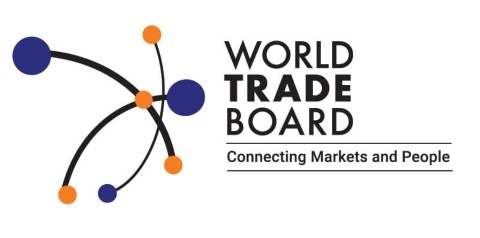Mission & Goals
Our mission is to improve people’s lives by connecting trade, finance and technology, enabling long-term growth and prosperity.
Goals
- Develop and promote ‘Digital Trade for Good’ – by encouraging the adoption of innovative digital trade solutions, effective policies and standards, that deliver inclusive, sustainable, fair and inclusive trade
- Define and deliver practical initiatives and recommendations across trade policy, finance and business technology to drive inclusive and sustainable trade, global growth and prosperity, by bringing together key stakeholders to foster co-operation, drive innovative thinking, and create a platform for positive change
Meet the Board
The World Trade Board, initiated by Finastra, is made up of global leaders, innovative thinkers, industry influencers and subject matter experts from the different corners of trade, finance and commerce.
The members are the co-creators of an organisation that has the objective of shaping the future and of being an enabling force for global trade, inclusion and prosperity. The Board shares a common vision which is a collaborative, connected, inclusive trade and finance network enabled by the latest business technologies, allowing the world to prosper. The Board, together with Finastra, is the driving force behind the annual World Trade Symposium and manages a number of working groups and programs to turn its vision into reality.
Strategic Advisors
World Trade Board Members

Pascal Lamy
World Trade Board Members
World Trade Board Members

Simon Paris

Jonathan T. Fried

Gerard Hartsink

Manoj Menon

Michael Vrontamitis

Kaushalya Somasundaram

Dr. Rebecca Harding

Dr. Adesegun A. Akin-Olugbade

Miguel A. Lopera

John W.H. Denton AO

Alisa DiCaprio

Isabel Fernandez
Partner Organizations
GLEIF
Executive summary for the LEI goal
The World Trade Board has three goals including to “initiative to drive adoption of Global Legal Entity Identifier (LEI)” numbers to connect trade, finance and technology, enabling long term growth and prosperity to improve people’s lives.
Since 2016, the World Trade Board has supported the global adoption of the LEI to improve transparency, digitisation, onboarding and risk management along the international supply chain.
What is the initiative proposed?
In consultation with the Global Legal Entity Identifier Foundation (GLEIF), the World Trade Board supports the global adoption of the LEI across all companies, including small and medium-sized businesses involved in cross border transactions. The World Trade Board members and the organisations they represent have an established task force focused on driving LEI adoption by businesses in cross border trade, as well as educating financial services institutions and technology firms. The aim is to encourage implementation and use of the LEI to empower market participants to cut costs, simplify and accelerate operations and gain deeper insight into the international supply chain..
The G20 initiated the creation of a global identification system as a way of enabling trust and transparency within the global financial system. In 2014, GLEIF was created by the Financial Stability Board to drive global implementation. Designed to provide greater transparency for governments and industries around the world, the Global LEI System enables the issuance of LEIs, and provides open, unrestricted access to LEI data that are freeof charge for users on a global scale.
Given the fundamental importance of this initiative, the World Trade Board members, in consultation with GLEIF, have continued to mobilise and coordinate with a wide variety of parties to increase the acceptance and opportunities for LEIs.
As of April 2021, there are 1.77 million LEIs worldwide and the Global LEI System is the only system that establishes a recognised, monitored and standardised global identity for legal entities, linked to the entity’s national ID system. This means the LEI is uniquely powerful in its ability to enable digital transformation in a way that is truly interoperable for everyone.
Why is this work important?
Many impediments to global trade and access to finance can be addressed with technology that exist today. Yet the success of these innovations and our ability to address impediments to trade through financial technology is largely predicated on our ability to easily, accurately and efficiently find, track and validate information about companies through databases containing huge volumes of information. Without an identifier for companies, this process is cumbersome, costly, unreliable and sometimes impossible.
What are the possibilities we can enable through greater adoption?
Broader adoption of LEIs has opened many possibilities, including:
- Improved Access to Finance for Small and Medium-Sized Enterprises (SMEs)
LEIs enable the counterparty information and analysis of company’s performance history, payment record, commercial disputes and full supply chain. This facilitates risk assessments, opening the door for financial institutions to provide more SME support and close (cross-border) financing gaps.
2. Financial Crimes and ‘Derisking’
- Online search for a company without an LEI makes financial crimes due diligence difficult, expensive and/or impossible.
- As a result, banks are exiting relationships, ‘de-risking’ to protect their business, especially in developing countries and banks are reluctant to acquire SME clients.
- LEIs, with verified information about ‘who is who’ will mitigate the risk of financial crimes by facilitating due diligence and render it less expensive by bringing standards into the Know Your Customer (KYC) process.
3. Enhance safeguards
- Ensuring goods are not manufactured through unethical or unlawful labour forces and in an environmentally sound manner would be greatly improved by identifiers tracking companies and their products moving through a global supply chain. Where LEI can help with easing KYC, it also provides opportunities for a new and important idea which could be termed Know Your Goods (KYG). This is concerned with the notion that increasingly, transparency into the provenance and traceability of goods is key for trust in today’s trading relationships.
- Any interested party can access and search the complete LEI data pool free of charge and without the need to register.
4. LEIs support the future development of fintech and digital identity.
- LEIs lay the foundation for fintech solutions to leverage global standards to streamline onboarding, gain greater insight and pave the way for new ‘smart’ digital contracts.
- The exciting potential of fintech is rooted in (i) finding, (ii) organising and (iii) tracking information from vast databases on a global basis across jurisdictions.
- The global adoption of the LEI supports this effort.
Digital Standards for Trade (DST)
A new World Trade Board initiative, Digital Standards for Trade (DST), is aiming to fuel interoperability in the trade supply chains among banks, shippers, customs, ports, and exporters and importers through standards and novel solutions. The project, originally incubated by MasterCard and launched in Singapore with the collaboration of multiple organisations, is now part of the World Trade Board.

